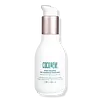What's inside
What's inside
 Key Ingredients
Key Ingredients

 Benefits
Benefits

 Concerns
Concerns

 Ingredients Side-by-side
Ingredients Side-by-side

Water
Skin ConditioningCetearyl Alcohol
EmollientButylene Glycol
HumectantCetrimonium Chloride
AntimicrobialBis-PCA Dimethicone
Behentrimonium Chloride
PreservativeCetrimonium Methosulfate
AntimicrobialCocos Nucifera Oil
MaskingDisodium PEG-12 Dimethicone Sulfosuccinate
CleansingEthylhexyl Palmitate
EmollientParfum
MaskingLactic Acid
BufferingPersea Gratissima Oil
Skin ConditioningPrunus Armeniaca Kernel Oil
MaskingPunica Granatum Seed Oil
EmollientQuaternium-91
Stearamidopropyl Dimethylamine
EmulsifyingSodium Benzoate
MaskingAminomethyl Propanol
BufferingPotassium Sorbate
PreservativeEthylhexylglycerin
Skin ConditioningGlycerin
HumectantPassiflora Edulis Fruit Extract
Skin ConditioningTetrasodium Glutamate Diacetate
Water, Cetearyl Alcohol, Butylene Glycol, Cetrimonium Chloride, Bis-PCA Dimethicone, Behentrimonium Chloride, Cetrimonium Methosulfate, Cocos Nucifera Oil, Disodium PEG-12 Dimethicone Sulfosuccinate, Ethylhexyl Palmitate, Parfum, Lactic Acid, Persea Gratissima Oil, Prunus Armeniaca Kernel Oil, Punica Granatum Seed Oil, Quaternium-91, Stearamidopropyl Dimethylamine, Sodium Benzoate, Aminomethyl Propanol, Potassium Sorbate, Ethylhexylglycerin, Glycerin, Passiflora Edulis Fruit Extract, Tetrasodium Glutamate Diacetate
Ethylhexyl Palmitate
EmollientHomosalate
Skin ConditioningOctocrylene
UV AbsorberEthylhexyl Salicylate
UV AbsorberCaprylic/Capric Triglyceride
MaskingCoco-Caprylate
EmollientC13-15 Alkane
SolventButyl Methoxydibenzoylmethane
UV AbsorberHelianthus Annuus Seed Oil
EmollientIsopropyl Palmitate
EmollientCitrullus Lanatus Seed Oil
EmollientPrunus Armeniaca Kernel Oil
MaskingVp/Eicosene Copolymer
Psidium Guajava Fruit Extract
AstringentAnanas Sativus Fruit Extract
Skin ConditioningTheobroma Cacao Seed Extract
AntioxidantAcetyl Hexapeptide-1
Skin ConditioningTocopherol
AntioxidantLecithin
EmollientParfum
MaskingWater
Skin ConditioningEthylhexyl Palmitate, Homosalate, Octocrylene, Ethylhexyl Salicylate, Caprylic/Capric Triglyceride, Coco-Caprylate, C13-15 Alkane, Butyl Methoxydibenzoylmethane, Helianthus Annuus Seed Oil, Isopropyl Palmitate, Citrullus Lanatus Seed Oil, Prunus Armeniaca Kernel Oil, Vp/Eicosene Copolymer, Psidium Guajava Fruit Extract, Ananas Sativus Fruit Extract, Theobroma Cacao Seed Extract, Acetyl Hexapeptide-1, Tocopherol, Lecithin, Parfum, Water
 Reviews
Reviews

Ingredients Explained
These ingredients are found in both products.
Ingredients higher up in an ingredient list are typically present in a larger amount.
Ethylhexyl Palmitate, also known as octyl palmitate, is created from 2-ethylhexyl alcohol and palmitic acid. It is a fatty acid ester.
The fatty acid content of Ethylhexyl Palmitate makes it an emollient. Emollients help soften and hydrate your skin by trapping moisture within.
Ethylhexyl Palmitate is also used to help improve the texture of cosmetics. It helps other ingredient dissolve in products and help disperse ingredients more evenly.
You'll likely find this ingredient in sunscreen, as it is often used to mix UV-blocking ingredients such as avobenzone and ethylhexyl triazone.
It can also help stabilize the fragrances in a product as a fragrance fixative.
Ethylhexyl Palmitate can be used to substitute mineral oil.
Due to its high fatty acid content, it may not be fungal-acne safe.
Learn more about Ethylhexyl PalmitateParfum is a catch-all term for an ingredient or more that is used to give a scent to products.
Also called "fragrance", this ingredient can be a blend of hundreds of chemicals or plant oils. This means every product with "fragrance" or "parfum" in the ingredients list is a different mixture.
For instance, Habanolide is a proprietary trade name for a specific aroma chemical. When used as a fragrance ingredient in cosmetics, most aroma chemicals fall under the broad labeling category of “FRAGRANCE” or “PARFUM” according to EU and US regulations.
The term 'parfum' or 'fragrance' is not regulated in many countries. In many cases, it is up to the brand to define this term.
For instance, many brands choose to label themselves as "fragrance-free" because they are not using synthetic fragrances. However, their products may still contain ingredients such as essential oils that are considered a fragrance by INCI standards.
One example is Calendula flower extract. Calendula is an essential oil that still imparts a scent or 'fragrance'.
Depending on the blend, the ingredients in the mixture can cause allergies and sensitivities on the skin. Some ingredients that are known EU allergens include linalool and citronellol.
Parfum can also be used to mask or cover an unpleasant scent.
The bottom line is: not all fragrances/parfum/ingredients are created equally. If you are worried about fragrances, we recommend taking a closer look at an ingredient. And of course, we always recommend speaking with a professional.
Learn more about ParfumThis ingredient is the oil from the apricot.
Apricot Kernel Oil is an emollient and helps soften skin. This is due to its fatty acid components. Some of these fatty acids include linoleic and oleic acid.
This ingredient also has antioxidant properties from Vitamins A, C, and E. Antioxidants help fight free-radicals. Free-radicals are molecules that may damage your skin cells. Besides being antioxidants, these vitamins provide plenty of skin benefits as well.
Learn more about Prunus Armeniaca Kernel OilWater. It's the most common cosmetic ingredient of all. You'll usually see it at the top of ingredient lists, meaning that it makes up the largest part of the product.
So why is it so popular? Water most often acts as a solvent - this means that it helps dissolve other ingredients into the formulation.
You'll also recognize water as that liquid we all need to stay alive. If you see this, drink a glass of water. Stay hydrated!
Learn more about Water